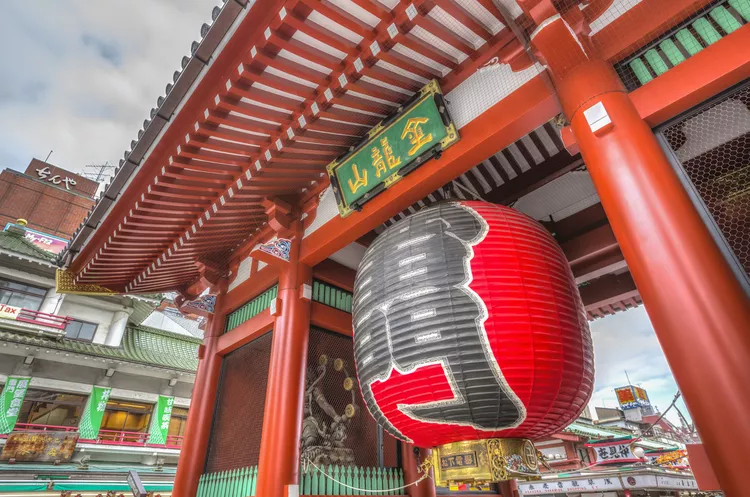Summary of Attractions in Asakusa
1. Ride a Traditional Rickshaw
2. Traipse Through Tokyo’s Oldest Temple
3. Go Back in Time
4. Taste Tempura
5. Watch a Sumo Match
6. Take in Tokyo’s Best View
7. Then, Get a Lesser-Known View of Asakusa
8. Start Your Trip to Nikko
Tokyo is, by some measures, the largest city in the world. On the other hand, as you probably realize if you’ve ever been there, it’s less of a traditional metropolis centered around one nucleus, and more a compilation of smaller cities, each with its own unique character and flavor.
It’s difficult to overstate the importance of the Asakusa district, both because of its general popularity among Tokyo travelers, as well as the wide range of attractions found there. Consult this guide before you make the trip to Asakusa to ensure you don’t miss anything!
Ride a Traditional Rickshaw
:max_bytes(150000):strip_icc():format(webp)/DSCF1314WEB-cdc7342476d04c1aa7feed3bf3ddf83e.jpg)
Most of what you see upon arriving in Asakusa is decidedly futuristic, so it might surprise you to learn that the best way to see this district is by rickshaw. Not just any rickshaw, but perhaps the most traditional form: pulled by young men using only their physical strength.
In addition to being a charming way to see Asakusa, riding in a rickshaw paints the most extensive portrait of the district. Since many of the drivers are local or intimately familiar with Asakusa, you’ll be treated to trips down seemingly random alleyways that may prove to be hidden treasures on your Japan itinerary!
Traipse Through Tokyo’s Oldest Temple
:max_bytes(150000):strip_icc():format(webp)/Senso-Ji-5a2f501589eacc0037ac03e9.jpg)
Address: 2-chōme-3-1 Asakusa, Taito City, Tokyo 111-0032, Japan
Phone: +81 3-3842-0181
Visit website
Once you delve into its history, you’ll realize that Asakusa is one of Tokyo’s more ancient wards. Senso-ji Temple, for example, is technically the city’s oldest temple, established in 645 AD. It has been rebuilt several times after historical events such as the Great Kanto Earthquake of 1923 and the bombings of World War II.
The Japanese put great effort into adhering to original architectural and design principles in their reconstructions. Consequently, Senso-ji will charm you as if it were original, even though it has been restored.
Go Back in Time
:max_bytes(150000):strip_icc():format(webp)/Asakusa-Handicrafts-5a2f510a22fa3a0037be0ac7.jpg)
Rickshaws and temples are not the only relics of the past in Asakusa. The district’s excellent museums provide insight into what Asakusa was like during Japan’s Edo period and even earlier, offering a fascinating glimpse into the art, cuisine, culture, and more.
The Edo Shitamachi Traditional Crafts Museum showcases handicrafts popular during the Edo period and features modern artisans who still practice these crafts. Furthermore, the Amuse Museum focuses on performing arts from both past and present, including a functioning Ukiyo-e theater that highlights the dramatic art form inherent to this unique “woodprint” style.
Taste Tempura
:max_bytes(150000):strip_icc():format(webp)/GettyImages-149406735-5a468d0b89eacc00371c11f8.jpg)
It is difficult to identify the exact origins of tempura in Japan. This deep-fried delicacy emerged after foreign traders arrived in Japan following the opening of its ports in the mid-16th century, marking an early instance of fusion cuisine.
Nonetheless, the variety and quality of tempura in Asakusa are unparalleled. For a casual experience, enjoy a quick lunch at Tentake. Alternatively, for dinner, consider visiting Daikokuya, which serves the fried dish in a surprisingly upscale setting.
Watch a Sumo Match
:max_bytes(150000):strip_icc():format(webp)/GettyImages-529477342-5a468e20482c520036b075e7.jpg)
Address: 2-chōme-17-3 Ryōgoku, Sumida City, Tokyo 130-0026, Japan
Phone: +81 3-3631-3856
Although it may be challenging to find sumo matches within Asakusa itself, the true home of sumo is just next door in the Ryogoku district. Consequently, this is an exciting excursion to include in your Asakusa itinerary, even if it requires a short journey away from the ward.
For a full sumo experience, plan ahead and prepare to spend several hours at Ryogoku Kokugikan stadium. However, there are alternative options available, including watching morning sumo practices or capturing a photo with one of the renowned sumo wrestlers you may encounter on the streets.
Take in Tokyo’s Best View
:max_bytes(150000):strip_icc():format(webp)/DSCF1249WEB-16a40fb16a3547ce8d44ec5821429e8e.jpg)
Address: 1-chōme-1-2 Oshiage, Sumida City, Tokyo 131-0045, Japan
Phone: +81 570-550-634
Arguably, no structure represents the modern-to-futuristic aesthetic of Asakusa better than the Tokyo Sky Tree, located just a short walk (or rickshaw ride) from Asakusa landmarks like Senso-ji Temple.
Whether you appreciate this 2,080-foot giant from the ground or ascend to the observatory for breathtaking panoramic views, it is an essential part of your Asakusa exploration.
Then, Get a Lesser-Known View of Asakusa
:max_bytes(150000):strip_icc():format(webp)/View-of-Senso-ji-5a2f4ed8ec2f640037e3136e.jpg)
Address: 2-chōme-18-9 Kaminarimon, Taito City, Tokyo 111-0034, Japan
Phone: +81 3-3842-5566
Not all outstanding views in Asakusa are from great heights. To enjoy a more focused view of Asakusa’s most significant landmarks, head to the rooftop of the Asakusa Culture and Tourist Information Center.
This venue is free to enter and allows for excellent aerial photography of Asakusa, which is particularly beneficial if you have a fear of heights that might prevent you from visiting the Sky Tree.
Start Your Trip to Nikko
:max_bytes(150000):strip_icc():format(webp)/Nikko-5a2f4f977d4be80036c586c2.jpg)
Address: 1-chōme-1-3 Asakusa, Taito City, Tokyo 111-0032, Japan
Most onward journeys from Tokyo begin from busy train stations like Tokyo, Shinjuku, and Shinagawa, utilizing the national Japan Rail (JR) company. While it is possible to reach the UNESCO World Heritage city of Nikko (often deemed Tokyo’s most scenic day trip) using JR trains from Tokyo station, the most direct route is to take the private Tobu line departing from Asakusa station.
Tip: Unless you manage to indulge in these other incredible activities in Asakusa before lunchtime, it might be wise to stay overnight here and set off for Nikko the following morning. Both destinations are rich with history, and rushing either would mean missing out on their unique charm!




